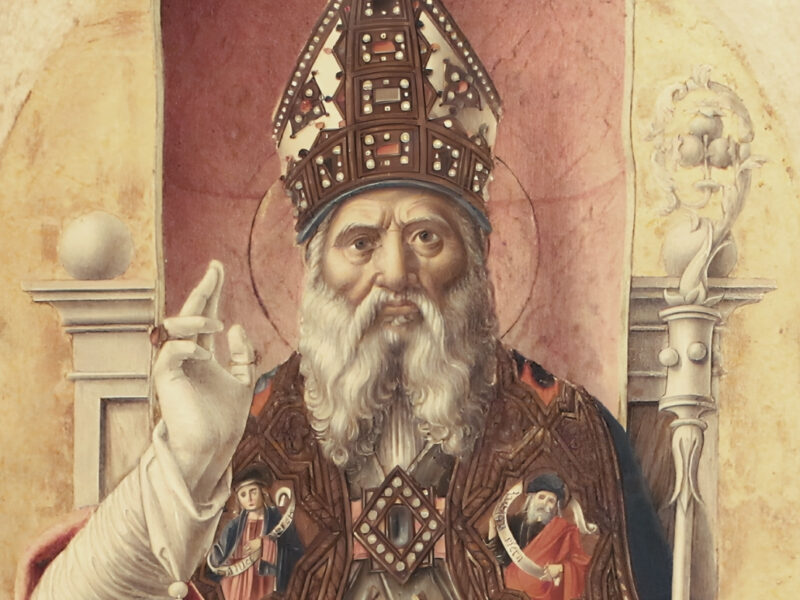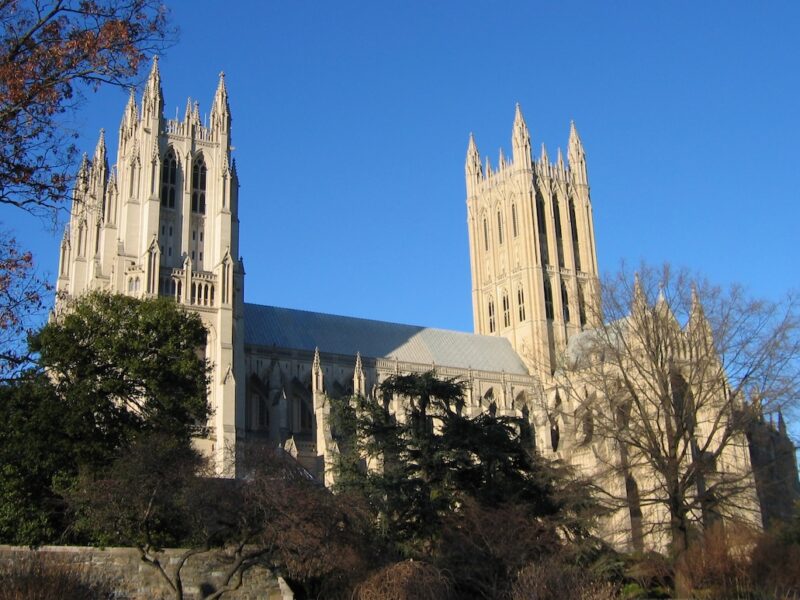I think chasubles should be burned, miters should be thrown away, thuribles should be melted down, and icons should be removed. Bishops should rebuke priests who elevate the host per Article XXVIII. If you insist on fixing the Holy Table to the wall, you should offer from the north end. Bells are prohibited. Scarfs instead of stoles. Processionals narrowly tolerated, and then only a cross, not a crucifix.
My name is Bryce Lowe, and I romanticize Anglican worship. I am, in Prayer Book words, in “peril of idolatry.”
I write this essay because I have noticed in myself a growing tendency to scoff at Anglican churches that worship differently than I would prefer. I point out how their worship contradicts the 1662 rubrics. I point to the Thirty-Nine Articles and shake my head at their aberrant liturgical practices. I pine for “Reformational Anglicanism” (whatever that even means) and wish that we all returned to chaste, simple, Protestant worship instead of all this frilly, luxurious, decadent Popery.
More than that, I chastise the other side for their idolatry. I mean, we have a whole homily called “Against Peril of Idolatry” which makes up an enormous quantity of the two Books of Homilies, a scathing invective against the use of images and extravagant decorating of houses of worship. It is easy for me (as it was for the Puritans and other Reformed congregations) to turn up my nose at the use of visual items in worship, the swinging of smelly smoke, and the fabulous garments of East-facing priests. “Idolaters,” I say, “Worshipers of worship.” And then I retreat to my apartment and scheme up “how the Reformers would have wanted it,” and I fantasize about having my own parish where we can, at last, do it all right. At last, we can have a clear East window and a massive pulpit, and I can wear choir dress for every service. Yes, surely they are the idolaters and I am worshipping in spirit and truth. Surely I have broken none of the commandments because I do not have any graven images in my vision of the perfect church.
But I do have graven images; they are just harder to see. I do worship worship. I am as idolatrous as the people I chastise and likely more than a great many of them. As I criticize “them” for concerning themselves more with the outward forms of worship than the development of a broken and contrite heart, I myself obsess over simplicity of form, chaste worship, and low churchmanship. As I criticize them for their externalization of Christianity in behavior and liturgics, I myself obsess over externals and liturgics, just in the opposite direction. They are high, I am low. I idolize my lowness.
I began to realize this when I read Paul Zahl’s The Protestant Face of Anglicanism, which I expected to be a blasting critique of Anglo-Catholicism and broad churchmanship. But listen to how Zahl begins the last chapter:
For the renewal of Anglicanism to take place, it is required that a renewal of Christianity within Anglicanism take place. What is not required is a renewal of “Anglicanism” defined as some tertium quid which carries special value in itself. Such a view of “renewal” is seen in an exchange not so long ago at an American Episcopal clergy conference. One rector affirmed, “We sure need to rediscover the importance of evangelism!” Another commented, “Yes, we need to know more about our Anglican identity so we can know what we are really sharing.” This second, “clarifying” comment bespoke disaster and a worrisome confusion. The comment implied that the Church is this quantity, “Anglicanism,” the manna of which the world is dying to partake. Such a view, not to mention its sectarian understanding of Church, totally underestimates the gravity of the human situation, the depth of pain to which the world religions speak, and the particular radicality of God’s engagement with sin, death, and the law which Christianity affirms. If it is Anglicanism as a blessed tertium quid that is “such as we have to give” (Acts 3:6), then we are “of all men most to be pitied” (1 Cor. 15:19)![1]
If (as I have been) you find yourself convicted that you elevate low church as the high churchman elevates the bread, take comfort in the remembrance that it is not the bread (host or wafer), the minister (sacerdos or presbyter), or the ceremony (high or low) which ultimately matters—what matters is that to which these signs point: Jesus Christ, the Son of God, and his “full, perfect, and sufficient sacrifice, oblation, and satisfaction, for the sins of the whole world.” By all means, have your discussions, your differences, and your practices. Not all distinctions are pedantic, and not all judgments are preferences. But let us always remember the log in our own eye and the idols in our own heart; we needn’t look to a dripping crucifix over a high altar to find an idol—we need only look in the mirror. Let us let go of our idols, high and low, and rejoice that God loves to hear His children worship His Son through the Spirit with “This poor lisping, stammering tongue.”
Note
- Zahl, Paul F.M. The Protestant Face of Anglicanism. Grand Rapids: Eerdmans, 1998, 71. ↑





'In Peril of Idolatry' have 13 comments
March 21, 2023 @ 10:06 am Gavin Pate
Bryce, thank you for this article. Your thoughts are convicting and inspire deeper reflection. God bless you in your studies. May Christ be at the center of all our worship, regardless of churchmanship.
March 23, 2023 @ 11:57 am Bryce Lowe
Thanks very much for reading, Gavin, and for the encouragement.
March 21, 2023 @ 10:18 am Don Warrington
I explained to my class that the beginnings of the Church of England were messy and complicated, and it’s been that way ever since. The sooner we recognise that, the better.
http://vulcanhammer.org/2023/03/16/liturgy-pentecost-wesley-and-the-book-of-common-prayer-part-i-the-book-of-common-prayer-wesley-the-1789-and-1928-bcp%ca%bcs/
March 21, 2023 @ 10:38 am The Rev. Sudduth Rea Cummings
After growing up in our family church, the First Christian (Disciples of Christ) which was really am iconoclastic 19th Century American frontier movement, the Holy Spirit drew me the Episcopal Church. But that was way back in 1964 and the rector of the parish was a former Disciples minister. I was drawn by the focus on the Sacraments and the presence of our Lord in the Reserved Sacrament (by way of St. Augustine’s Prayer Book of the Order of the Holy Cross.). All of which makes me anathema to any snake belly low churchman! I give thanks for the Oxford Movement and its heroes and aspects of the following Ritualist movement. Now I am retired, I miss having an altar at which to celebrate the Holy Eucharist, but I don’t miss the churchmanship disputes and battles that still continue. My hero of the church remains William Augustus Muhlenberg, Priest, 1877 (and listed in the Lesser Feasts and Fasts, founder of the Church of the Holy Communion on 6th Avenue, NYC, tragically now a nightclub! It should be a shrine to one of the saints of the Anglican tradition. I was privileged to attend worship there while I was student at GTS and pray that Muhlenberg would be better remembered as one who led the revival of sacramental worship and Christian Education. He founded St. Johnland on Long Island as ministry of liturgical reform, Christian community and ecumenical action.
March 21, 2023 @ 11:27 am Fr. Joseph
At a class at Trinty, it was discussed why the celebrant would elevate the host. Intention matters. Is the celebrant elevating the host because the laity will not commune and this is the high point of making a spiritual communion for them? Or when a celebrant elevates the host, is it part of the seamless action of offering the Son to the Father through the Holy Spirit? And if when elevating the host the celebrant does so in order to demonstrate the greatest reverence for all that Our Lord accomplished for us and is being accomplished anew as an anamnesis at that moment, and the entire oblation is meant to be received with faith and love, does the elevation have anything to do with medieval transubstantiation? The Byzantine Rite elevates the gifts and does not believe in the doctrine of transubstantiation. Intention matters.
It would be a great charity if those in the REC could let each parish find its own way in these very troubling times for Christianity in the West within the Low, Broad, and Catholic traditions of Anglicanism. If all the Christians within her ranks agree on the major doctrines, why argue over vestments, incense, and views on what saints can or cannot do?
March 21, 2023 @ 11:47 am Gavin Pate
Fr. Joseph, thank you for your comments. You are right on to call for charity on these matters. There is a big difference in intent and impact. I, for one, enjoy dialogue with other ministers who differ from me, not to argue but to discover more about myself and the Body of Christ. Thanks again for your comment that helps us see this opportunity.
March 21, 2023 @ 2:08 pm The Rev. Sudduth Rea Cummings
I’ve always elevated the host==not for adoration but as offering as the author suggests. The beauty of Anglicanism is the tolerance for a wide spectrum of practice. However, this does NOT include tolerance for heresy or unbelief as some have suggested.
March 21, 2023 @ 4:19 pm Fr. Rick
What does the REC have to do with this?
March 21, 2023 @ 12:12 pm Gage Rewerts
I was expecting a scathing and vitriolic tirade against the worship my heart and conscience find most pleasing and am convicted from the other side of the divide in the same way you share: I have looked down upon my low church brethren. Mea culpa, Mea maxima culpa. This is an important memo for Anglicans everywhere. Let he who ornaments, and he who abstains from ornamentation, do so to the glory of God.
March 23, 2023 @ 11:58 am Bryce Lowe
Thank you for reading, Gage. I appreciate these thoughts from the nosebleed section : )
March 21, 2023 @ 2:27 pm Matthew J. Taylor
Necessary reading, especially for pedants like myself.
March 23, 2023 @ 11:58 am Bryce Lowe
Thanks for reading, Matthew.
March 21, 2023 @ 5:58 pm The Rev. Sudduth Rea Cummings
Mutual respect is important. Forsaking making judgments of others practices is an important aspect of Godly love in the Body of Christ. The churchmanship wars of the past should be left in the past.